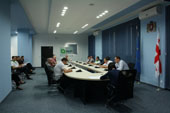
Election monitors in place and ready for today's elections
By Salome Modebadze
Monday, October 1
3, 613, 851 voters will define the fate of Georgia’s new parliament members on October 1. The choice should be made among fourteen political parties and two election blocks at 3,719 Precinct Election Commissions (PEC) in Georgia and 45 PECs abroad.
According to the Commission for Ensuring Voter List Accuracy, there are 22, 666 citizens with a foreign address indicated in the address column; 23, 044 citizens with an address in an occupied territory indicated the address column and who are not registered as internally displaced persons; and 4,720 citizens who can’t be identified by election precincts on the basis of indicated addresses. Mamuka Katsitadze, the Chairman of the Commission for Ensuring Voter List Accuracy, said his teams is oriented on three issues: to ensure that the status “abroad” was shown in the list; to have “deregistered” people at separate registrars; and also to withdraw “dead” souls from the final list.
The largest constituency of 73 districts is registered in the capital Tbilisi which has 1,025,455 voters, followed by 162,732 voters in Kutaisi, in the Imereti region - the place of the new parliament.
Eka Azarashvili, spokesperson of the CEC, said over 61, 000 local and 400 international observers will monitor today’s elections including the election administrations of 15 countries: Moldova, Latvia, Armenia, Azerbaijan, Bulgaria, etc.
The International Election Observation Mission, comprising a total of 401 observers from 42 countries includes 290 long-term and short-term observers will present their preliminary post-election statement at a news conference on Tuesday, 2 October, in Tbilisi.
The delegation deployed by the OSCE Office for Democratic Institutions and Human Rights (OSCE/ODIHR), as well as 53 parliamentarians and staff from the OSCE Parliamentary Assembly (OSCE PA), 22 from the Parliamentary Assembly of the Council of Europe (PACE), 14 from the NATO Parliamentary Assembly (NATO PA), and 14 from the European Parliament (EP) met with the election participants on Sunday.
Davit Bakradze, number one candidate in the election list of the ruling party, hoped in freedom and democracy of parliamentary elections. But Labor Party member Kakha Dzagania expressed suspicion that the ruling party and Georgian Dream coalition would falsify the results of the election.
Despite the “critical” amount of violations against his Georgian Dream, coalition leader Bidzina Ivanishvili expressed his confidence in winning the parliamentary elections with a big percentage, which he said will set a precedent in Georgian modern history of changing the government through elections. Ivanishvili said it would be impossible to falsify elections because the observers have “principal position” to monitor elections. “If you recognize, we will be with you, and vice versa,” he referred to the international delegation.
In an interview to Rustavi 2, Kenneth Wollack, President of the National Democratic Institute (NDI) said international society is interested in democratic election processes not its results. He said it is up to the Georgian people to define the fate of the elections and make a choice in a competitive environment. “We are here to express our support towards the people’s choice,” he stated.
After meeting with the Georgian Dream coalition members, IRI’s delegation leader US Congressman David Dreier, expressed his excitement and interest “to see the people of Georgia play a role in determining their future.”
Richard Norland, the new US ambassador to Georgia, also called the political parties and candidates “to ensure that actions and rhetoric support a calm and peaceful” Election Day in an atmosphere free of intimidation. Emphasizing that the US does not support any political party or candidate, but focuses and supports Georgia’s efforts to build democratic institutions, the US Embassy expressed support for “free and fair elections in Georgia that will consolidate the country's democratic gains and bring Georgia closer to achieving its Euro-Atlantic aspirations.”
Chiora Taktakishvili, spokesperson of the UNM said the ruling party will carry out an “invitation campaign” for voters today by providing the voters with free transport financed from the election campaign. She said they will do everything to preserve peace and avoid possible confrontation with opponents so that the volunteers and coordinators engaged into the campaign of the UNM will be deployed in the vicinity of the polling stations.
The voting process is secret and no one will know whom the particular voter has circled; the short video film prepared in the frames of It Affects You (Es Shen Gekheba) campaign informs the voters stressing that the supremacy of their choice will be fully protected on Election Day.
Non-government organizations also have encouraged voters not to go to Precinct Election Commissions (PEC) in T-shirts or other accessories connected with the parties they support. Lela Taliuri from the Georgian Young Lawyer Association (GYLA) said such an action may be considered agitation which is forbidden in the polling station and can be fined.
GYLA’s over 500 mobile and static observers will also monitor elections in Tbilisi and nine regions throughout the country, moreover several observers will monitor the Election Day in the US, France, Great Britain, Germany and Hungary.
GYLA and other local NGOs will not only attend the process of counting votes in PECs but would count the votes in a parallel regime. On Election Day they will hold briefings at a special media centre to provide the public with the news about the election process.

